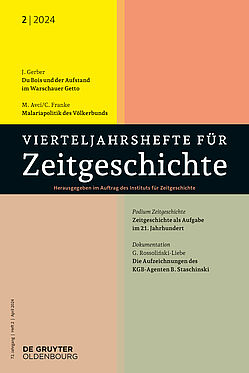- The Institute
- Research
- Dictatorships in the 20th Century
- Democracies and their Historical Self-Perceptions
- Transformations in Most Recent History
- International and Transnational Relations
- Edited Source Collections
- Dissertation Projects
- Completed Projects
- Dokumentation Obersalzberg
- Center for Holocaust Studies
- Berlin Center for Cold War Studies
- Publications
- Vierteljahrshefte
- The Archives
- Library
- Center for Holocaust Studies
- News
- Dates
- Press
- Recent Publications
- News from the Institute
- Topics
- Munich 1972
- Confronting Decline
- Feminist, Pacifist, Provocateur
- Der Mauerbau als Audiowalk
- Digital Contemporary History
- Transportation in Germany
- Envisaged Futures at the End of the Cold War
- From the Reichsbank to the Bundesbank
- German Federal Chancellery
- History of Sustainabilities: Discourses and Practices since the 1970s
- Changing Work
- Democratic Culture and the Nazi Past
- The History of the Treuhandanstalt
- Foreign Policy Documentation (AAPD)
- Dokumentation Obersalzberg
- Hitler, Mein Kampf. A Critical Edition
- "Man hört, man spricht"
- IfZ
- Vierteljahrshefte
- VfZ Archive
- Issue Index
- 2024
- Issue April 2024
Issue 2/2024
Content Overview: English Titles and Abstracts:
- Jan Gerber, W.E.B. Du Bois and the Warsaw Ghetto Uprising. A Primal Scene of “Multidirectional Memory”? - A deeper look into the issue
- Meral Avci/Christian Franke, Between Fighting the Pandemic and Economic Interests. The Quinine Cartel and the Malaria Policy of the League of Nations .
- Contemporary History Podium: Contemporary History as a Task for the 21st Century. Themes, Concepts, Perspectives
- Grzegorz Rossoliński-Liebe, From the Notes of an Assassin. The KGB Agent Bohdan Stashynskyi and the Murders of Lev Rebet and Stepan Bandera in Munich, Newspaper article SZ
Abstracts
Jan Gerber, W.E.B. Du Bois and the Warsaw Ghetto Uprising. A Primal Scene of “Multidirectional Memory”?
W.E.B. Du Bois’ text “The Negro and the Warsaw Ghetto”, first published in 1952, is often made use of in debates about the uniqueness of the Holocaust, its relationship to other genocides of the 20th century and a suitable form of commemoration for the mass atrocities of modernity. Michael Rothberg even called it a central inspiration for his concept of “multidirectional memory”. However, such a usage mostly stems from expectations, desires and projections of the present. Du Bois’ text is rather to be understood against the background of the Cold War, the strategies of the Communist Party of the United States of America and the history of acculturation of the American Jews.
Meral Avci/Christian Franke, Between Fighting the Pandemic and Economic Interests. The Quinine Cartel and the Malaria Policy of the League of Nations
The article investigates how the interwar Malaria Commission of the League of Nations negotiated concrete recommendations to contain the Malaria epidemic while torn between (national) entrepreneurial as well as scientific interests on the one hand and transnational responsibility on the other hand. Using the example of the Third Malaria Report of 1933, it discusses why – despite highly diverging scientific opinions regarding the effectiveness of Quinine and synthetic substances (Plasmochin and Atebrine) – there was a clear decision in favour of Quinine. The article also shows how the Malaria Commission successively lost the international authority it had gained during the 1920s. This decline was exacerbated by the withdrawal of Germany and (in 1937) Italy, both of which were pillars of Malaria research.
Contemporary History Podium: Contemporary History as a Task for the 21st Century. Themes, Concepts, Perspectives
Our seventh Contemporary History Podium is dedicated to what constitutes contemporary history as a field of research and as a subfield of historiography. Starting from Hans Rothfels’ groundbreaking reflections in the first article of Vierteljahrshefte für Zeitgeschichte, Julia Angster covers the topic “Contemporary History between National and Global History”, while Kiran Klaus Patel debates the question “The Contemporary History of Europe as Supranational History?” Subsequently Eckart Conze deals with an aspect which has almost been forgotten for quite some time, “War, Peace and Security as Research Perspectives for Contemporary History”, while Martin Rempe discusses the rewards as well as the risks of a contemporary history of globalisation. Finally, Frank Bösch draws attention to another topic closely connected to globalisation: “Contemporary History in the Digital Age”.
Grzegorz Rossoliński-Liebe, From the Notes of an Assassin. The KGB Agent Bohdan Stashynskyi and den Murders of Lev Rebet and Stepan Bandera in Munich
The documentation presents central passages of the memoirs of the KGB agent Bohdan Stashynskyi, which are held by the Archives of the Bundesnachrichtendienst (Foreign Intelligence Service of Germany). Stashynskyi was a talented but internally torn assassin, who went down in the history of the intelligence services and the Cold War because of his assassinations of the leaders of the Organisation of Ukrainian Nationalists (OUN), Lev Rebet and Stepan Bandera. In his notes, which he wrote after his intentional arrest in order to seek judicial leniency, he reported what made him join the KGB, successfully infiltrate the nationalist underground in western Ukraine, murder OUN leaders in Munich and finally turn his back on probably the most brutal of all intelligence services.
07/26/2024
„Was macht ein westdeutscher Geheimdienst-Chef in der DDR?“
Die "Welt" greift einen VfZ-Beitrag zum Fall Otto John auf
mehr
07/19/2024
„Ein starkes Stück“
Die FAZ über Rainer Volks Dokumentation zum 20. Juli 1944 im Juliheft der VfZ
mehr
07/16/2024
Aktuelle Entwicklungen im Publizieren wissenschaftlicher Zeitschriften
Notizen vom Leibniz Journal-Management-Workshop
mehr








